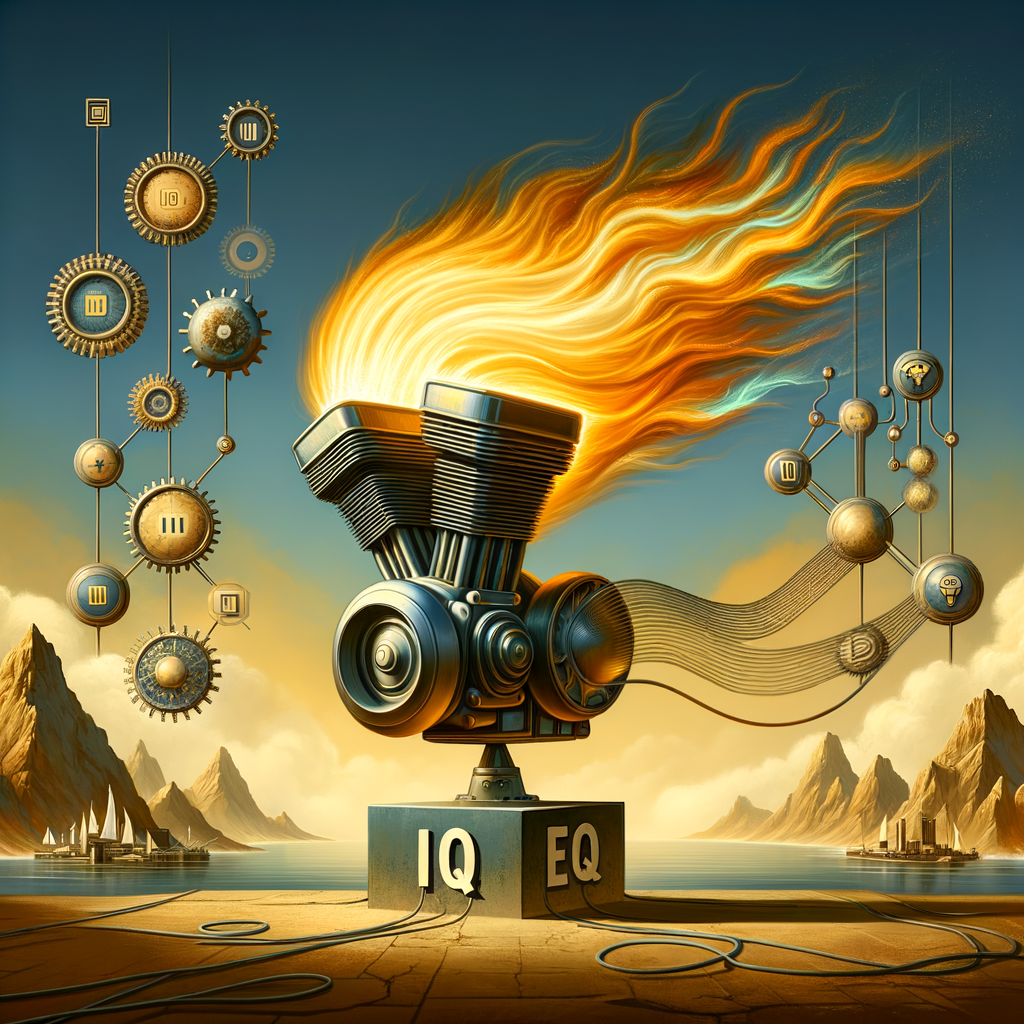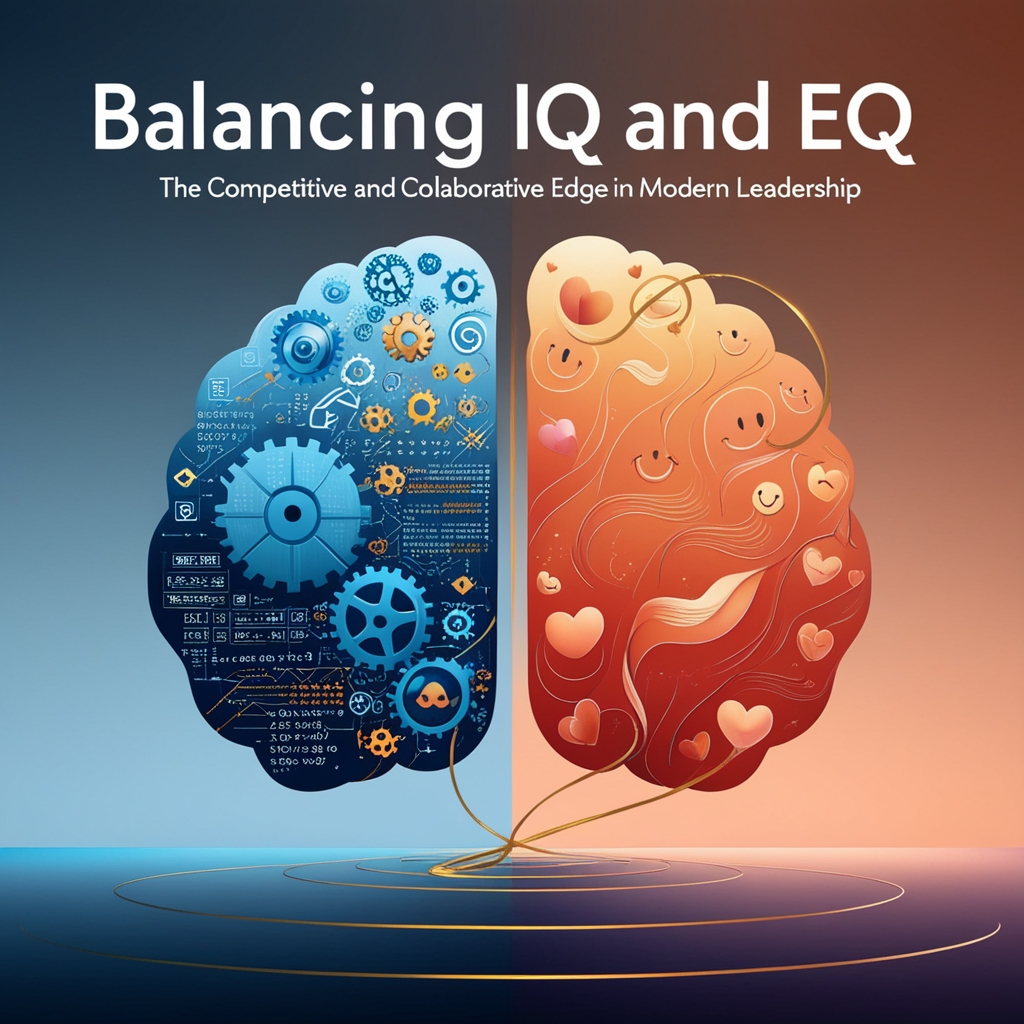In a world increasingly defined by competition and collaboration, leaders are expected to embody a unique blend of cognitive and emotional strengths. This is especially true for leaders whose ability to succeed depends as much on how you think as it does on how you connect with others.
Intelligence Quotient (IQ) and Emotional Quotient (EQ) are often framed as opposing forces in the arsenal of a leader. Yet they are two distinct but equally vital traits that shape leadership effectiveness. While IQ is celebrated for driving analytical prowess and innovation, EQ empowers them to conform strategically, fostering trust, influence, and collaboration.
Both are indispensable, but their impact is distinct and understanding the distinct roles of IQ and EQ can help leaders craft strategies that position them for sustained success.
Intelligence Quotient (IQ)
The Competitive Edge
IQ represents the raw cognitive ability to analyze, innovate, and solve problems. It is a critical driver of individual and organizational competitiveness, enabling leaders to stay ahead in dynamic and fast-evolving markets. It is the engine of intellectual innovation, enabling individuals to:
1.
Outperform Competitors
High-IQ leaders excel in identifying patterns, solving complex problems, and developing groundbreaking strategies. For example, in industries like technology or healthcare, innovation often stems from individuals who can grasp complex systems and optimize them for maximum efficiency. Their ability to outperform competitors stems from their sharp thinking and data-driven decision-making.
2.
Push Boundaries to differentiat
IQ helps leaders and organizations carve out unique market positions. By leveraging their cognitive strength, these leaders create innovative products, streamline processes, and set benchmarks others struggle to meet. For instance, Elon Musk’s vision for Tesla’s electric vehicles emerged from his ability to think deeply about technological innovation and market disruption.
3.
Build Personal Brands
Leaders with high IQ frequently emerge as thought leaders within their industries. Their deep understanding of technical and strategic matters allows them to deliver value through insights and expertise. This intellectual dominance positions them as pioneers, attracting both talent and customers to their organizations.
However, IQ alone is not enough. Success in leadership requires more than just standing out—it demands the ability to connect, influence, and work within complex interpersonal dynamics. Pure intelligence, untempered by emotional awareness, can isolate individuals, making it difficult for them to align with team dynamics or organizational goals.
Emotional Quotient (EQ)
The Collaborative Influence
EQ, in contrast, is the measure of one’s ability to understand and manage emotions—both their own and others’. While IQ builds technical and analytical credibility to help people stand out, EQ equips them to fit in, adapt, and thrive within complex social systems by establishing social credibility. It allows leaders to adapt to different environments, foster collaboration, and drive change. It empowers leaders to:
1.
Conform Strategically
EQ isn’t about blind conformity; it’s about understanding the nuances of group dynamics and aligning behaviors to organizational or cultural expectations. This ability enables one to intuitively understand how to navigate social environments to fit in, gain trust, and build credibility.
2.
Influence and Inspire
Influence is not about authority—it’s about earning trust and aligning others toward a common vision. Leaders with high EQ inspire loyalty through empathy, authenticity, and effective communication. They know how to engage teams, motivate individuals, and galvanize support for organizational goals, often outperforming more intellectually gifted counterparts in leadership roles.
3.
Resolve Conflict
EQ allows individuals to navigate interconnected, collaborative work environments, and complex ecosystems where conflicts are inevitable. Leaders with EQ excel at navigating interpersonal challenges with tact and empathy, diffusing tensions, understanding different perspectives, and ensuring disagreements don’t derail progress. Their ability to resolve disputes without alienating stakeholders ensures smoother operations and stronger relationships.
4.
Drive Change
While IQ may identify the need for change, EQ ensures its successful implementation. Transformational leaders use emotional intelligence to address resistance, by addressing concerns empathetically, engage stakeholders to foster buy-in and create a culture to drive lasting transformation that embraces innovation and evolution.
The IQ-EQ Synergy
While IQ and EQ are often viewed in isolation, their combined application creates a leadership model that is both competitive and collaborative. A balanced leader knows when to lean on their cognitive strengths and when to apply emotional intelligence to inspire others. Their IQ allows them to devise innovative solutions to technical challenges, while their EQ ensures they can communicate the value of these solutions to diverse stakeholders, from technical teams to investors.
Case in Point: Steve Jobs and Emotional Influence
Steve Jobs provides a quintessential example of a leader who mastered the synergy between IQ and EQ. While his IQ enabled him to develop revolutionary products, such as the iPhone and iPad, his EQ allowed him to inspire his teams and win customer loyalty. Jobs wasn’t just an inventor; he was a visionary storyteller who connected emotionally with his audience, creating a global movement around Apple’s products.

Choosing the Right Tool for the Right Job
While IQ is crucial for excelling in competitive, technical, or analytical roles, EQ becomes indispensable when navigating interpersonal complexities, building coalitions, or leading transformations. A well-rounded leader recognizes when to rely on their intellectual prowess and when to leverage their emotional intelligence.
Key Insights for Leaders
To thrive in today’s business landscape, leaders must master the art of balance. IQ is the engine that drives competition and innovation, propelling individuals to stand out. EQ, on the other hand, is the glue that binds teams, fosters influence, and drives collaboration. Together, they form the foundation of impactful, future-ready leadership.
1. When to Leverage IQ:
• During strategic planning, innovation, or technical problem-solving.
• To differentiate yourself or your organization in competitive markets.
• When creating intellectual frameworks or solutions that demand high cognitive ability.

2. When to Leverage EQ:
• In managing teams, resolving conflicts, or influencing stakeholders.
• While driving organizational change or aligning diverse teams toward common goals.
• To build trust, foster collaboration, and establish a strong organizational culture..
To thrive in today’s business landscape, leaders must master the art of balance. IQ is the engine that drives competition and innovation, propelling individuals to stand out. EQ, on the other hand, is the glue that binds teams, fosters influence, and drives collaboration. Together, they form the foundation of impactful, future-ready leadership.
The Future Belongs to Balanced Leaders
As organizations become more complex and interconnected, the demand for leaders who can both think critically and connect meaningfully will continue to grow. IQ may set you apart, but EQ will bring others along with you. Together, they create the perfect recipe for impactful and sustainable leadership.
So, ask yourself: Are you nurturing both your cognitive and emotional capabilities? By embracing both IQ and EQ, you’ll not only stand out but also build the influence necessary to lead in a way that leaves a lasting legacy.

